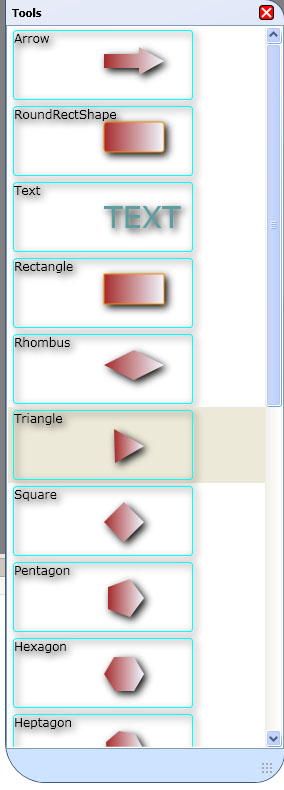使用 WPF 的图形绘制工具
3.33/5 (5投票s)
WPF 图形绘制工具
引言
本文介绍 WPF 及其绘图工具。
代码结构与我在 CodeProject 上的另一篇文章类似,链接如下:
WinFormVersions of GraphicsDrawingTool.aspx
背景
要理解本文,您需要了解一些 WPF 技术。例如 DrawingContext、FrameworkElement 类及其用法,以及如何编写 XAML GUI 界面。
使用代码
该项目首先创建一个工具箱,如下所示:

然后用户可以在屏幕上绘制他们选择的形状,如下所示:

然后可以将绘图导出为 XML 文件或 JPG 文件。
<?xml version="1.0" encoding="utf-8"?> <ShapeList xmlns:xsi="http://www.w3.org/2001/XMLSchema-instance" xmlns:xsd="http://www.w3.org/2001/XMLSchema"> <ShapeList> <LeShape xsi:type="LeRectangle"> <ShowBorder>true</ShowBorder> <LeBorderColor> <A>255</A> <R>0</R> <G>0</G> <B>0</B> </LeBorderColor> <BorderWidth>1</BorderWidth> <Rect> <X>300</X> <Y>157</Y> <Width>79</Width> <Height>65</Height> </Rect> <LeFromColor> <A>30</A> <R>255</R> <G>0</G> <B>0</B> </LeFromColor> <LeToColor> <A>30</A> <R>255</R> <G>255</G> <B>255</B> </LeToColor> <LightAngle>225</LightAngle> <Fill>true</Fill> </LeShape> <LeShape xsi:type="RoundRectShape"> <ShowBorder>true</ShowBorder> <LeBorderColor> <A>255</A> <R>0</R> <G>0</G> <B>0</B> </LeBorderColor> <BorderWidth>1</BorderWidth> <Rect> <X>174</X> <Y>230</Y> <Width>84</Width> <Height>74</Height> </Rect> <LeFromColor> <A>255</A> <R>0</R> <G>0</G> <B>0</B> </LeFromColor> <LeToColor> <A>255</A> <R>127</R> <G>255</G> <B>212</B> </LeToColor> <LightAngle>225</LightAngle> <Fill>true</Fill> <Radius>10</Radius> </LeShape> <LeShape xsi:type="ZoneShape"> <ShowBorder>true</ShowBorder> <LeBorderColor> <A>255</A> <R>0</R> <G>0</G> <B>0</B> </LeBorderColor> <BorderWidth>1</BorderWidth> <Rect> <X>132</X> <Y>97</Y> <Width>90</Width> <Height>84</Height> </Rect> <LeFromColor> <A>30</A> <R>255</R> <G>0</G> <B>0</B> </LeFromColor> <LeToColor> <A>30</A> <R>255</R> <G>255</G> <B>255</B> </LeToColor> <LightAngle>225</LightAngle> <Fill>true</Fill> <TextField> <ShowBorder>true</ShowBorder> <LeBorderColor> <A>255</A> <R>0</R> <G>0</G> <B>0</B> </LeBorderColor> <BorderWidth>1</BorderWidth> <Rect> <X>237</X> <Y>112</Y> <Width>58</Width> <Height>22</Height> </Rect> <LeFromColor> <A>30</A> <R>255</R> <G>0</G> <B>0</B> </LeFromColor> <LeToColor> <A>30</A> <R>255</R> <G>255</G> <B>255</B> </LeToColor> <LightAngle>225</LightAngle> <Fill>true</Fill> <Caption>Shape 2</Caption> <LeTextFont> <Size>10</Size> <Name>Tahoma</Name> <Style>Regular</Style> </LeTextFont> <LeTextColor> <A>255</A> <R>255</R> <G>0</G> <B>0</B> </LeTextColor> <TextSize>10</TextSize> </TextField> <Caption>Shape 2</Caption> </LeShape> </ShapeList> </ShapeList>
稍后可以使用该 XML 文件通过此项目重新打开,最终用户可以再次编辑他们的绘图。
以下是该项目源代码的解释。
该项目首先使用以下代码在 GUI 上创建一个画布:
<Border Margin="10" CornerRadius="3" Grid.Row="1" Grid.Column="1" Background="Beige">
<Border.BitmapEffect>
<DropShadowBitmapEffect />
</Border.BitmapEffect>
<Canvas Margin="3" x:Name="DrawingCanvas" Background="AliceBlue" Opacity="1" Visibility="Visible">
<local:CustomRender Canvas.Top="0" Canvas.Left="0" x:Name="shapeCollection">
<local:CustomRender.BitmapEffect>
<DropShadowBitmapEffect />
</local:CustomRender.BitmapEffect>
</local:CustomRender>
</Canvas>
</Border>
上面的代码首先创建一个带有阴影的 Border,Border 位于 Grid 控件内,因此它将填充 Grid 的单元格。Border 内部的内容是一个 Canvas 控件,Canvas 内部只有一个 FrameworkElement,我们的 DLL (CustomRender),它只是一个元素,然后我们使用该元素的 DrawingContext,手动绘制所有形状。DrawingContext 类似于 WinForm 的 Graphics 对象。
我们的 CustomRender 只是一个 FrameworkElement,它只接受 Visual 对象。最重要的是,它实现了以下两个函数:
// Provide a required override for the VisualChildrenCount property.
protected override int VisualChildrenCount
{
get { return childrens.Count; }
}
// Provide a required override for the GetVisualChild method.
protected override Visual GetVisualChild(int index)
{
if (index < 0 || index >= childrens.Count)
{
throw new ArgumentOutOfRangeException();
}
return childrens[index];
}
然后在我们的代码中,我们只需要将 Visual 对象添加到这个 Visual 对象集合中,.NET Framework 将为我们渲染这个 CustomRender 对象。
我们使用反射将形状添加到我们的控制器类中,首先只创建一个形状,然后将形状的 Visual 对象添加到上面的 CustomRender 类中。
Point pt = e.GetPosition(myCanvas);
ConstructorInfo constructor = myTool.GetConstructor(new Type[] { typeof(Point) });
CurShape = constructor.Invoke(new object[] { pt }) as LeShape;
shapeCollection.AddObject(CurShape.myVisual);
当我们想要绘制这个形状时,我们可以随时调用以下方法:
DrawingContext dc = myVisual.RenderOpen();
Draw(dc);
if (selected)
{
if (bounds.Width > 5 && bounds.Height >5)
{
DrawPoints(dc, bounds);
}
}
dc.Close();
DrawingVisual 的 RenderOpen 方法将为我们打开一个 DrawingContext,然后我们可以绘制我们的对象,如果形状被选中,那么我会为它绘制几个跟踪点。完成所有这些操作后,我们必须调用 DrawingContext 的 Close 方法,以告知我们已经完成了此 Visual 的绘制。
这是我的绘图工具的 WPF 版本的原理,如果您感兴趣,也可以在我的 WinForms 版本中获取更多信息。
关注点
在编写代码的过程中,你学到了什么有趣/好玩/令人恼火的东西吗? 你做了什么特别巧妙、疯狂或异想天开的事情吗?
历史
在此处保持您所做的任何更改或改进的实时更新。
